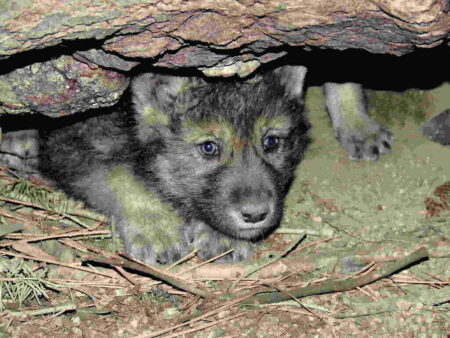|
Getting your Trinity Audio player ready...
|

Ever hear the phrase “Dogs are man’s best friend?” A new study published in Current Biology on July 12, 2021, suggests this saying could absolutely be true and due to reasons. According to the study, researchers found that domesticated pups are more responsive to humans than wolf pups.
Researchers believe this could be due to the fact that dogs have been living with humans for over 14,000 years. This domesticated the animals giving them “theory of mind” skills. These are skills that allow the animals to have some understanding of what people are feeling and thinking.
Previous studies showed that domesticated puppies have “early emerging skills to cooperate (and) communicate with humans,” according to Brian Hare — a professor of evolutionary anthropology at Duke University in North Carolina and the current study’s senior author.
This leaves people wondering if dogs inherited these traits through evolution or whether it is a product of thousands of years of domestication.
According to Hare’s study, dogs show “early emerging skills that seem to be heritable really are a product of domestication, because wolves don’t have that same development or pattern of development.” However, there is limited or inconclusive knowledge on whether wolves — even ones raised by humans at a young age — will respond to human gestures as dogs do.
Hare and his team compared 37 grey wolf pups to 44 dog puppies. The wolf pups were from the Wildlife Science Center in Minnesota. The dog puppies— Labrador retrievers, golden retrievers, and golden-lab mixes — were mainly from Canine Companions for Independence. All of the animals were between five and 18 weeks old.
 Ten to 11 days after the wolf pups’ births, they were raised around the clock with human contact — including being fed by caregivers and sleeping with them at night.
Ten to 11 days after the wolf pups’ births, they were raised around the clock with human contact — including being fed by caregivers and sleeping with them at night.
The domesticated pups stayed with their mothers. Their mothers fed them until they were six weeks old. They stayed with their littermates until they were almost eight weeks old. During this time the puppies had limited contact with their human caretakers.
Between seven to eight weeks old the dog puppies were tested. Researchers tested the wolf pups between nine to 13 weeks of age. Researchers would hide a treat in one of two bowls. Then they would give clues by pointing or gazing at where the treat was hidden. They also conducted this test by placing a wooden block next to where the treat was placed.
More often than not the dogs would outperform the wolves by choosing the correct indicated spot. In addition, 17 of 31 domesticated pups chose the correct bowl hiding the treat. However, zero of 26 wolf pups would do better than a random guess. The researchers also noted that the dog pups were more apt to approach human strangers than that of its wolf counterpart.
According to the study’s first author, Hannah Salomons — a doctoral student in Hare’s laboratory at Duke University — the study was not to see which animal was “smarter.”
There’s lots of different ways to be smart. Animals evolve cognition in a way that will help them succeed in whatever environment they’re living in.
She then gave the example of how the dog pups would run to greet humans when they entered their enclosures. Whereas the wolf pups would run “and hide.” Salomons also stated that the dog puppies would look to humans to help them open sealed food containers they were presented with. The wolf pups relied on themselves to open the containers.
Hare stated:
Dogs are really one of the most successful species on the planet. There’s some estimate of over a billion dogs. They’re on every continent where you find humans. And sadly, there’s just a few hundred thousand wolves remaining.
He added the study’s findings show that dogs can bond with people due to their human interaction skills. Wolves do not have the same experience their domesticated counterparts have had with humans. They are “obviously fearful of humans, and that doesn’t allow them to have the same kind of relationship… unfortunately, it means that humans have harassed and hunted and done terrible things to wolves, so there’s not many left.”
Written by Sheena Robertson
Source:
CNN: Puppies ‘get’ us more than human-raised wolf puppies do, study finds; Kristen Rogers
Top and Featured Image Courtesy of simonpbriggs1975’s Flickr Page – Creative Commons License
Inline Image by Hilary Cooley Courtesy of U.S. Fish and Wildlife Service Headquarters’s Flickr Page – Creative Commons License



